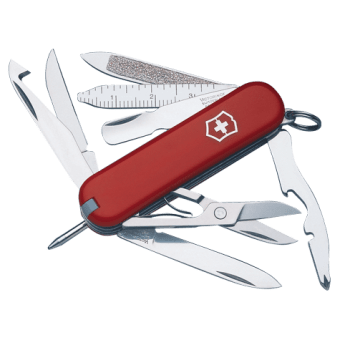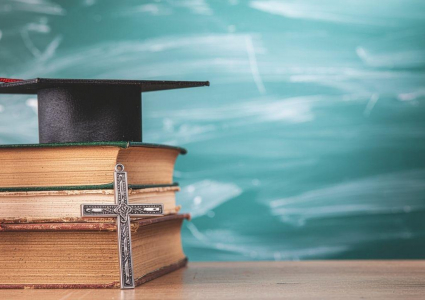Classical Education: The Original Multi-Tool

I joined the Boy Scouts in middle school, in part because of an irresistible incentive. “Join the Scouts,” my dad promised, “and I’ll buy you a Swiss Army knife.” For those not familiar, a Swiss Army knife was the only tool a man would ever need in life. It had knife blades, of course, but it also had a bottle opener, a saw blade, a corkscrew, and a pair of scissors. Some used it only to whittle pine for their wood carving merit badge. It was capable of much more, though. It was hard for a middle-school boy to imagine any tool more versatile.

Classical learning is the Swiss Army knife of education. It does more than help students tackle a single task. It equips them with useful tools for nearly whatever life sends their way.
Many view classical K–12 education as ideal preparation for college. Students study history, Bible, literature, Latin, logic, math, science, and the arts. They memorize names, dates, places, events, quotes, charts, formulas, and pieces of music. They discover how to think deeply about these things, too, looking for the whys that connect them. Students learn to analyze what they see and hear and to ask whether it’s true. They learn how to persuade an audience to believe and embrace the truth, as well. Whatever students pursue in college, they’ll have benefitted from their classical schooling.
Classical education prepares students for college like no other education. It’s more than a single tool, though. More important, the college-preparation tool isn’t the one that every student needs.
Before parents assume it is, they should ask themselves a few questions. Am I expecting to send my child to college because I went (or my spouse or family members did)? Or maybe because I didn’t go? Or because “respectable” families send their children off to university? Do I want to send them to college because they won’t get good jobs otherwise? Or because there are no other viable and rewarding alternatives?
However parents answer, none is a sufficient reason to send a child to college. Young adults should head off to university when one and only one condition is met. They should go only if it’s likely to be the best preparation for the rest of their life.
How does a parent answer that question, though? We don’t have the benefit of knowing God’s plans for our children’s lives. (Even if we did, knowing how to make them a reality might not be obvious.) Still, we are capable of considering two key factors. What are my child’s strengths and weaknesses—mental, emotional, physical, and spiritual? What are the needs of the vocational path my child’s likely to follow? God tends to work in and through the answers to these questions. Consider a couple of examples.
Maria was born with skates on. From her earliest years, she was in her element when on the ice. What Chariots of Fire runner Eric Liddel sensed on the track, Maria sensed on the rink. Both felt the pleasure of God. Maria learned a lot from her classical schooling, but she was never so content as when skating. By her high school years, she was competing at the national and international levels. So she could pursue her Olympic dreams, she and her parents decided she’d delay college. College could wait a few years (or longer); her training couldn’t.
Matthew was always good at math and language. His brain thought in numbers and symbols as easily as in words and sentences. What’s more, he enjoyed computer software more than the average kid. He wanted to know how it worked and how it could be improved. His brother left college with a computer science degree but with too few useful skills. Matthew took a different path. After a K–12 classical education, he enrolled in top-tier online coding schools. He finished them with highest marks, coveted certifications, and many job offers.
The role of higher education today isn’t what it was in the 1960s . . . or 80s. Then, most college educations were tickets to brighter futures. Today, too many young adults leave college with a framed diploma, a mountain of debt, and little else.
Their vocational futures aren’t always so promising as they expected, either. Graduates in 2020 are competing against students who opted for nontraditional paths. Business majors compete with 20-somethings who run several online marketplaces. Digital-marketing majors go up against young adults with several years of on-the-job training. Fifty years ago, college degrees all but guaranteed a good job the day after graduation. The times, though, they are a changin’.
None of this change means that no student should go to college, of course. It means only that the best bridge from high school to the rest of life isn’t the same for everyone. College will still be the best way forward for many. For some, though, the bridge will be apprenticeships, certifications, and on-the-job training. For others, it’ll be some business savvy and some start-up capital. Some, even, will find that the bridge looks more like a backpack, a Bible, and a beach in Thailand.
Our society and the economy that supports it are transforming rapidly. Parents will do well to consider these changes as they envision their children’s future. A question they should come back to continually is one we hinted at above. Will college be the best preparation for the rest of their children’s lives? If so, then all involved should pursue it with purpose and passion. If not, however, they should be willing to explore alternatives. Not only are there more of them today than in the 1980s, but they’re often better.
Classical education is a Swiss Army knife with many possibilities. Its sturdiest, sharpest blade can help students carve out a successful college career. For many students, that’ll be the exact tool they want and need. A classical education is capable of much more, though. It can help students blaze new trails—paths that don’t lead to college, but do lead to fulfillment. Whatever path high-schoolers take, they’ll discover the utility of their classical learning. It’ll be hard for them to imagine any tool more versatile.







